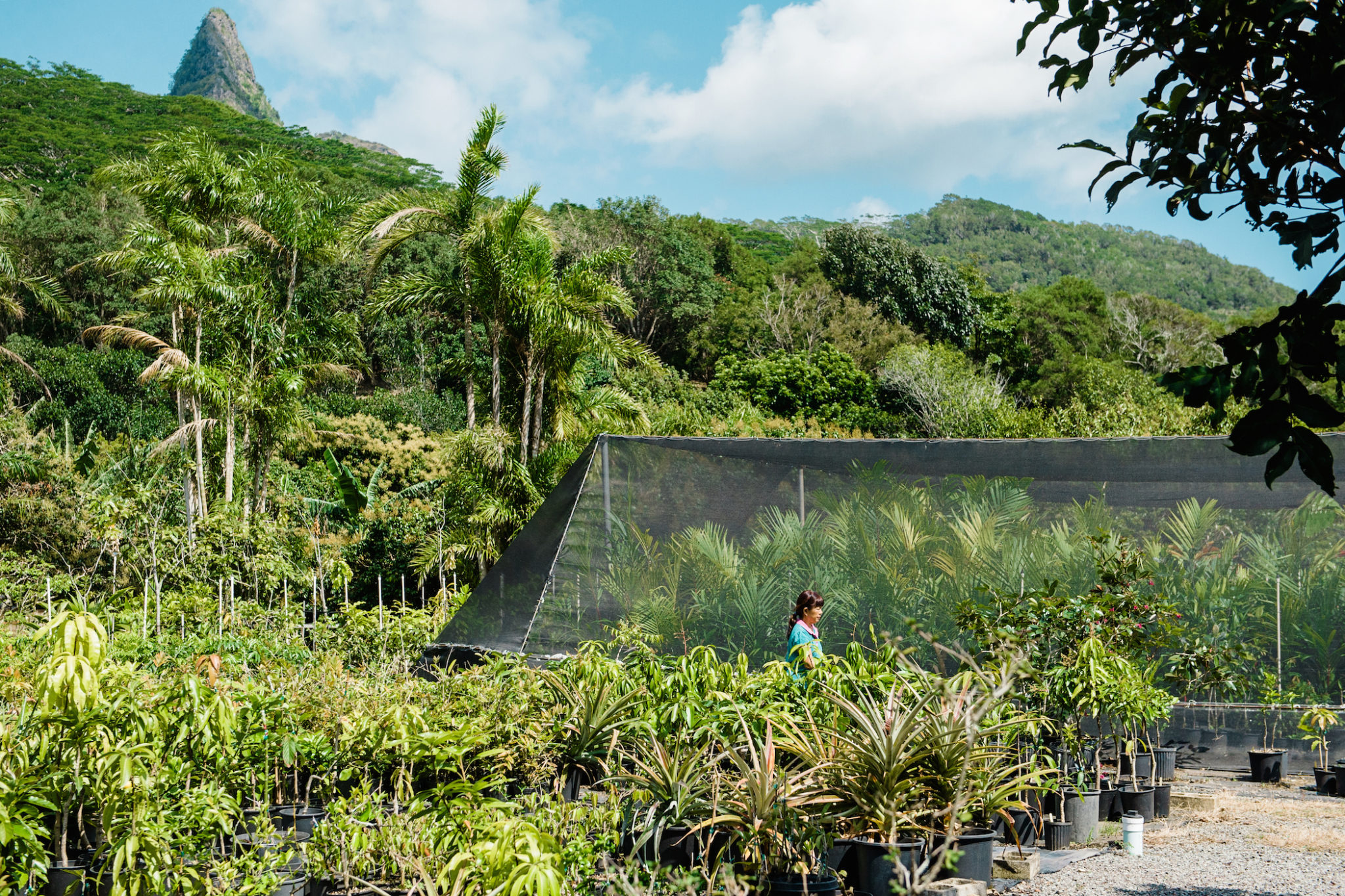Images by John Hook
One Waimānalo fruit tree farm holds the golden ticket in an uncertain future.
A brown pueo flies from the entrance of a farm marked by a sign that reads, “Frankie’s Nursery—Tropical Fruit Tree Specialist.” As I drive up the narrow pathway, large mango, sapodilla, and avocado trees planted firmly in the ground seem to turn toward me.
The wind rushes through their leaves. At the top of the hill, a robin-egg blue building stands in the middle of lush, green farmland.
Hundreds of trees and bushes yield fruits in all sizes, shapes, and colors. Some are tall, some are short, and some are hidden in the shadows of the 15-acre farm.
I wander on foot until I reach a lovely hillside overlooking Waimānalo bluffs. The back of my neck begins to tingle, and I realize that this is no ordinary farm. “Hello,” says Lynn Tsuruda, wife of the farm’s namesake, Frankie Tsuruda. “Follow me, I want to show you something.”
Amidst beautiful, dense lines of trees, workers pick exotic fruits like mangosteen, rambutan, and durian.
They also harvest those of a more unusual variety: the miracle berry, which turns sour to sweet; the black sapote, a persimmon that tastes like chocolate pudding; and the Meli Kalima, a super-sweet, acid-free pineapple.
Within half an hour, an entire crate is full to the brim with crunchy guavas, sugar pears, sweet limes, and jackfruits the size of a dog. Lynn hands me a piece of pineapple cut from a small, green body.
“Try it! It’s world-famous! We made it ourselves!” The pale-yellow fruit is so sweet and juicy I think its core must be made of some rare, magical substance.
“The pineapple hybridization was a curious incident,” a soft voice behind me says. “Something happened with the pollen from the plant of a Hilo White and a Dry Sweet. I planted all the seeds from the plant, and two years later, we had about 50 selections that we thought were good. Number 13 was the winner.”

The voice, of course, belongs to Frankie. He has on a pair of glasses and is fidgeting with sticks, tape, and a dozen or so potted plants. His eyes zero in on a plant grafting system, which reminds me of something surgical.
“What I’m doing is getting the branch from a good tree and putting it onto a seedling,” he says. “The plant will mimic the original cultivar, but in way less time.”
Frankie’s interest in botany and horticulture began at a very young age, when he would climb his grandfather’s trees and pick fruit. It was because of his grandfather that plants became not only a hobby but also his livelihood.
Despite earning a business degree from the University of Hawai‘i at Mānoa, Frankie couldn’t shake his passion for plants. He spent years growing trees on his mother’s property in Mililani, and he worked as a production manager for Evergreen Nursery before opening Frankie’s Nursery in 1979.
“It must’ve skipped a generation,” he says. “My father was never interested in this kind of stuff, but for me it comes naturally. Back then, it was harder to make a living off of plants, but now we have to think sustainable, and in case something goes wrong, at least we will have something in our yard.”
Naturally, his words made me think about how sacred food is—especially in Hawai‘i. If we had to learn to live off the land again, how would we do it? What would we eat if our overseas food supply was cut off?
The very dirt and silence of the farm seems to tingle with answers to hard questions like these. So do the dishes Frankie and Lynn prepare: miracle berry-infused Soylent, jackfruit stew, and black sapote mousse. I can imagine the couple starting their own line of cookbooks with peculiar titles like Grass Is Good and The Joy of Cooking … with Fleshy Fruit.
While the fruits at Frankie’s Nursery aren’t going to change everything, they may bring a little happiness to a dark and unstable future. Now if only they had snozzberries and lickable wallpaper.
Frankie’s Nursery is located in Waimānalo at 41-999 Mahiku Pl. For more information, visit frankiesnursery.com

